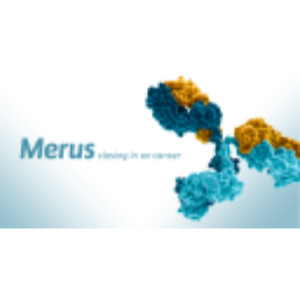Merus announces First Patient Dosed in Phase 2 Trial of Petosemtamab in 3L+ mCRC
Rhea-AI Summary
Merus (NASDAQ: MRUS) has initiated dosing in a Phase 2 trial evaluating petosemtamab as a monotherapy for heavily pretreated metastatic colorectal cancer (mCRC) patients who have received 3 or more lines of therapy. The open-label trial will assess the safety and antitumor activity of petosemtamab, a Biclonics® antibody targeting EGFR and LGR5, in patients who have previously received anti-EGFR therapy and lack certain mutations (KRAS, NRAS) as detected by ctDNA NGS testing. The drug was discovered through screening over 500 bispecific antibodies and has shown superior activity compared to cetuximab in preclinical CRC models.
Positive
- First patient dosed in Phase 2 trial, marking trial initiation milestone
- Preclinical data shows superior activity compared to established therapy (cetuximab)
- Drug developed through comprehensive screening of 500+ bispecific antibodies
Negative
- Early-stage trial with no efficacy data yet available
- patient population due to specific mutation requirements
News Market Reaction 1 Alert
On the day this news was published, MRUS gained 4.91%, reflecting a moderate positive market reaction.
Data tracked by StockTitan Argus on the day of publication.
UTRECHT, The Netherlands and CAMBRIDGE, Mass., Dec. 16, 2024 (GLOBE NEWSWIRE) -- Merus N.V. (Nasdaq: MRUS), a clinical-stage oncology company developing innovative, full-length multispecific antibodies (Biclonics® and Triclonics®) for cancer, today announced that the first patient has been dosed in the Company’s phase 2 trial evaluating petosemtamab monotherapy in heavily pretreated (3L+) metastatic colorectal cancer (mCRC). Petosemtamab is a Biclonics® targeting EGFR and LGR5.
The phase 2, open-label trial will evaluate the safety and antitumor activity of petosemtamab monotherapy in 3L+ mCRC, post anti-EGFR therapy. To be eligible for enrollment, patients must lack certain mutations as detected in plasma by ctDNA NGS, including KRAS, NRAS.
“We discovered petosemtamab from an unbiased screen of over 500 bispecific antibodies tested for the ability to inhibit cancer-derived, as compared to matched normal tissue derived, organoids. In preclinical CRC models, petosemtamab consistently demonstrates superior activity compared to cetuximab, a mainstay therapy in mCRC,” said John de Kruif Ph.D., Chief Technology Officer at Merus. “I am hopeful our unique platform technologies will translate into improved therapies for patients with heavily pretreated mCRC.”
About Petosemtamab
Petosemtamab, or MCLA-158, is a Biclonics® low-fucose human full-length IgG1 antibody targeting the epidermal growth factor receptor (EGFR) and the leucine-rich repeat containing G-protein-coupled receptor 5 (LGR5). Petosemtamab is designed to exhibit three independent mechanisms of action including inhibition of EGFR-dependent signaling, LGR5 binding leading to EGFR internalization and degradation in cancer cells, and enhanced antibody-dependent cell-mediated cytotoxicity (ADCC) and antibody-dependent cellular phagocytosis (ADCP) activity.
About Merus N.V.
Merus is a clinical-stage oncology company developing innovative full-length human bispecific and trispecific antibody therapeutics, referred to as Multiclonics®. Multiclonics® are manufactured using industry standard processes and have been observed in preclinical and clinical studies to have several of the same features of conventional human monoclonal antibodies, such as long half-life and low immunogenicity. For additional information, please visit Merus’ website and LinkedIn.
Forward-Looking Statements
This press release contains forward-looking statements within the meaning of the Private Securities Litigation Reform Act of 1995. All statements contained in this press release that do not relate to matters of historical fact should be considered forward-looking statements, including without limitation, statements regarding the evaluation of petosemtamab in patients with mCRC, the clinical study design and objectives of the phase 2 study; and the hope that our unique platform technologies will translate into improved therapies for patients with heavily pretreated mCRC. These forward-looking statements are based on management’s current expectations. These statements are neither promises nor guarantees, but involve known and unknown risks, uncertainties and other important factors that may cause our actual results, performance or achievements to be materially different from any future results, performance or achievements expressed or implied by the forward-looking statements, including, but not limited to, the following: our need for additional funding, which may not be available and which may require us to restrict our operations or require us to relinquish rights to our technologies or antibody candidates; potential delays in regulatory approval, which would impact our ability to commercialize our product candidates and affect our ability to generate revenue; the lengthy and expensive process of clinical drug development, which has an uncertain outcome; the unpredictable nature of our early stage development efforts for marketable drugs; potential delays in enrollment of patients, which could affect the receipt of necessary regulatory approvals; our reliance on third parties to conduct our clinical trials and the potential for those third parties to not perform satisfactorily; impacts of the volatility in the global economy, including global instability, including the ongoing conflicts in Europe and the Middle East; we may not identify suitable Biclonics® or bispecific antibody candidates under our collaborations or our collaborators may fail to perform adequately under our collaborations; our reliance on third parties to manufacture our product candidates, which may delay, prevent or impair our development and commercialization efforts; protection of our proprietary technology; our patents may be found invalid, unenforceable, circumvented by competitors and our patent applications may be found not to comply with the rules and regulations of patentability; we may fail to prevail in potential lawsuits for infringement of third-party intellectual property; and our registered or unregistered trademarks or trade names may be challenged, infringed, circumvented or declared generic or determined to be infringing on other marks.
These and other important factors discussed under the caption “Risk Factors” in our Quarterly Report on Form 10-Q for the period ended September 30, 2024, filed with the Securities and Exchange Commission, or SEC, on October 31, 2024, and our other reports filed with the SEC, could cause actual results to differ materially from those indicated by the forward-looking statements made in this press release. Any such forward-looking statements represent management’s estimates as of the date of this press release. While we may elect to update such forward-looking statements at some point in the future, we disclaim any obligation to do so, even if subsequent events cause our views to change, except as required under applicable law. These forward-looking statements should not be relied upon as representing our views as of any date subsequent to the date of this press release.
Multiclonics®, Biclonics® and Triclonics® are registered trademarks of Merus N.V.








